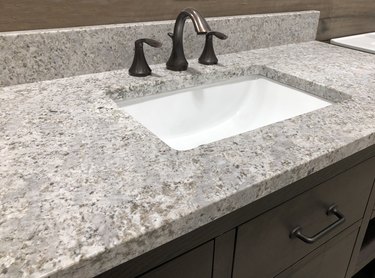Granite countertops look beautiful and are also made of some of the most durable and hard-wearing material available. However, one issue people can have with their granite countertops is water staining. This happens when water pools or drips onto a granite counter and is left there to dry. Water rings on granite are particularly common, as water on a cooler glass will form condensation and result in a circle of moisture on the counter.

Video of the Day
There is a debate around the best way to clean granite. Luckily, whether you're going for a homemade solution or wanting to use a store-bought cleaning product, there's a solution for you.
Video of the Day
Homemade Solutions for a Water Stain On Granite
When dealing with a water stain on granite, you want something that will effectively remove the stain without causing any damage to the granite. A fantastic homemade solution to this conundrum is baking soda.
To get the best results, you want to act as fast as possible before the stain sets in. First, pour out enough baking soda to cover the stain. Mix the powder in a bowl and add a small amount of 3 percent hydrogen peroxide. Keep adding it to the bowl until you have formed a thick paste. This mixture is sometimes referred to as a poultice. Spread this mixture over the entire stain, making sure the coverage is quite thick.
Get a small piece of plastic wrap and poke several small holes in it. Place the wrap over the poultice, sealing the edges to your counter with a little bit of water if necessary. Wait until your paste has fully dried into a powder – usually at least a day – then remove with a damp cloth. You can repeat this process on stubborn stains.
Best Products to Use as Granite Stain Remover
For light water staining, such as splash marks or water spots, you can use your usual dish detergent on a soft bristles brush, such as a dish brush. This should remove light marks quickly and effectively. You can mix your dish detergent with warm water and a small amount of rubbing alcohol to create a mixture with superior stain removing properties and a disinfectant element.
You can also purchase specialty granite stain remover from a supermarket or other cleaning supply store. Just make sure to check the ingredients beforehand in case there is anything too harsh or likely to cause damage to your countertop.
What Not to Use on Granite
In small concentrations, rubbing alcohol and hydrogen peroxide can be used to lift stains and water rings on granite. However, if they are used in too high a concentration, they can break down the surface of the granite and cause it to become more porous. Granite that is more porous is more prone to future staining, plus this compromises its durability. Granite countertops can be resealed and should be every couple of years as part of maintenance, but this is a more expensive process.
You should avoid using anything highly acidic as a granite stain remover. Although granite is a tough material, it is more susceptible to acidic formulas thanks to its alkaline make up. The primary acidic elements in cleaning products are ammonia, lemon juice or vinegar. Don't use these in your homemade concoctions, and check the label of any store bought granite stain remover before use. Acids will break down the surface of the granite and cause unnecessary damage.
You should also be careful with what tools you use when cleaning your granite countertops. You don't want to use something too harsh that could cause scratches in the granite. A soft bristled brush is a good option if you need to lightly scrub, and a damp cloth in combination with an effective product is even more gentle. Never use anything like wire wool or a Brillo Pad as this can cause irreparable damage to your granite countertop.